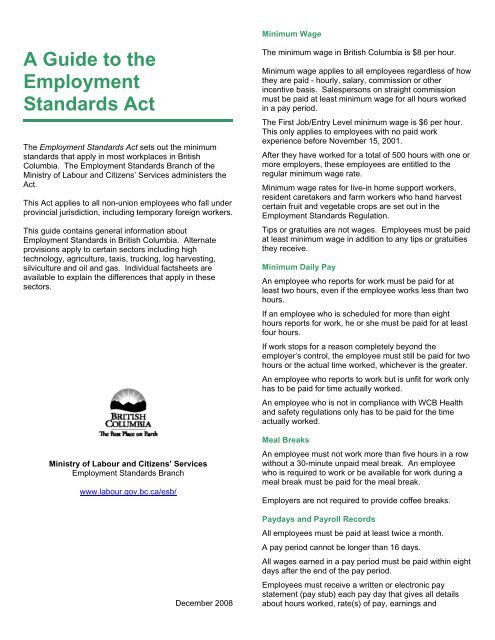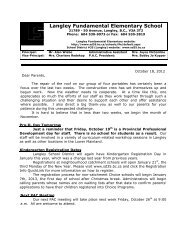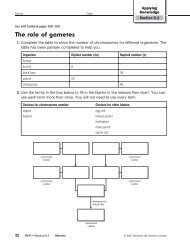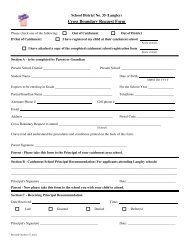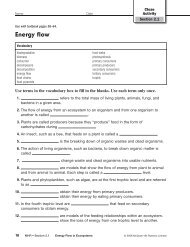Employment Standards Guide
Employment Standards Guide
Employment Standards Guide
Create successful ePaper yourself
Turn your PDF publications into a flip-book with our unique Google optimized e-Paper software.
A <strong>Guide</strong> to the<br />
<strong>Employment</strong><br />
<strong>Standards</strong> Act<br />
The <strong>Employment</strong> <strong>Standards</strong> Act sets out the minimum<br />
standards that apply in most workplaces in British<br />
Columbia. The <strong>Employment</strong> <strong>Standards</strong> Branch of the<br />
Ministry of Labour and Citizens’ Services administers the<br />
Act.<br />
This Act applies to all non-union employees who fall under<br />
provincial jurisdiction, including temporary foreign workers.<br />
This guide contains general information about<br />
<strong>Employment</strong> <strong>Standards</strong> in British Columbia. Alternate<br />
provisions apply to certain sectors including high<br />
technology, agriculture, taxis, trucking, log harvesting,<br />
silviculture and oil and gas. Individual factsheets are<br />
available to explain the differences that apply in these<br />
sectors.<br />
Ministry of Labour and Citizens’ Services<br />
<strong>Employment</strong> <strong>Standards</strong> Branch<br />
www.labour.gov.bc.ca/esb/<br />
December 2008<br />
Minimum Wage<br />
The minimum wage in British Columbia is $8 per hour.<br />
Minimum wage applies to all employees regardless of how<br />
they are paid - hourly, salary, commission or other<br />
incentive basis. Salespersons on straight commission<br />
must be paid at least minimum wage for all hours worked<br />
in a pay period.<br />
The First Job/Entry Level minimum wage is $6 per hour.<br />
This only applies to employees with no paid work<br />
experience before November 15, 2001.<br />
After they have worked for a total of 500 hours with one or<br />
more employers, these employees are entitled to the<br />
regular minimum wage rate.<br />
Minimum wage rates for live-in home support workers,<br />
resident caretakers and farm workers who hand harvest<br />
certain fruit and vegetable crops are set out in the<br />
<strong>Employment</strong> <strong>Standards</strong> Regulation.<br />
Tips or gratuities are not wages. Employees must be paid<br />
at least minimum wage in addition to any tips or gratuities<br />
they receive.<br />
Minimum Daily Pay<br />
An employee who reports for work must be paid for at<br />
least two hours, even if the employee works less than two<br />
hours.<br />
If an employee who is scheduled for more than eight<br />
hours reports for work, he or she must be paid for at least<br />
four hours.<br />
If work stops for a reason completely beyond the<br />
employer’s control, the employee must still be paid for two<br />
hours or the actual time worked, whichever is the greater.<br />
An employee who reports to work but is unfit for work only<br />
has to be paid for time actually worked.<br />
An employee who is not in compliance with WCB Health<br />
and safety regulations only has to be paid for the time<br />
actually worked.<br />
Meal Breaks<br />
An employee must not work more than five hours in a row<br />
without a 30-minute unpaid meal break. An employee<br />
who is required to work or be available for work during a<br />
meal break must be paid for the meal break.<br />
Employers are not required to provide coffee breaks.<br />
Paydays and Payroll Records<br />
All employees must be paid at least twice a month.<br />
A pay period cannot be longer than 16 days.<br />
All wages earned in a pay period must be paid within eight<br />
days after the end of the pay period.<br />
Employees must receive a written or electronic pay<br />
statement (pay stub) each pay day that gives all details<br />
about hours worked, rate(s) of pay, earnings and
deductions. Employers must keep payroll records for<br />
each employee for two years after employment ends.<br />
An employee must be paid in full within 48 hours after the<br />
employer ends the employment, or within six days if the<br />
employee quits. This time is by the clock and the calendar<br />
– not business hours or business days.<br />
Overtime<br />
Daily overtime pay is time-and-a-half after eight hours<br />
worked in a day and double-time after 12 hours worked in<br />
a day.<br />
Weekly overtime is time-and-a-half after 40 hours worked<br />
in a week. Only the first eight hours worked in a day count<br />
towards weekly overtime.<br />
Averaging Agreements<br />
An employer and an employee can agree to average<br />
scheduled work hours over a period of one, two, three,<br />
four weeks. Averaging agreements must be in writing,<br />
and have a start date and an end date.<br />
Overtime is payable:<br />
• After eight hours in a day if extra hours have been<br />
added to an employee’s schedule, or<br />
• If the employee works more than an average of 40<br />
hours in a week over the averaging period (e.g., 80<br />
hours over two weeks, 120 hours over three weeks.)<br />
Uniforms and Special Clothing<br />
If an employer requires an employee to wear a uniform or<br />
special clothing, the employer must provide, clean and<br />
maintain it at no cost to the employee.<br />
Special clothing is clothing that is easily identified with the<br />
employer. For example, clothing with a company logo or<br />
unique company colours.<br />
Special clothing includes a requirement to wear the<br />
garments that the business is currently selling. A dress<br />
code (no jeans, no cut-offs, dark clothing, business<br />
casual) is not a uniform.<br />
Employers and employees can agree that the employer<br />
will reimburse employees for cleaning and maintaining the<br />
special clothing.<br />
Personal safety equipment required by the Workers’<br />
Compensation Board is not considered special clothing<br />
unless the equipment also associates the wearer with the<br />
image or identity of the employer.<br />
Deductions<br />
An employer must make deductions from wages required<br />
by law (e.g., income tax, EI, CPP). Other deductions may<br />
be made if the employee agrees in writing.<br />
An employer cannot deduct any of the employer’s<br />
business costs from wages. This includes cash<br />
shortages, breakage, damage to company property or loss<br />
resulting from a customer leaving without paying.<br />
Statutory Holidays<br />
The nine statutory holidays in British Columbia are<br />
New Years Day<br />
Good Friday<br />
Victoria Day<br />
Canada Day<br />
B.C. Day<br />
Labour Day<br />
Thanksgiving Day<br />
Remembrance Day<br />
Christmas Day<br />
Easter Sunday, Easter Monday and Boxing Day are not<br />
statutory holidays.<br />
To qualify for statutory holiday pay employees must:<br />
• Have been employed for at least 30 calendar days,<br />
And<br />
• Have worked on at least 15 of the 30 days before the<br />
statutory holiday.**<br />
**Employees who worked under an averaging agreement<br />
any time in the 30 days before the statutory holiday do<br />
not have to meet the 15-day minimum.<br />
Qualified employees who are given a day off on a<br />
statutory holiday must be paid an average day’s pay.<br />
Qualified employees who work on a statutory holiday must<br />
be paid:<br />
Time-and-a-half for the first 12 hours worked and<br />
double-time after 12 hours<br />
Plus<br />
An average day’s pay.<br />
An average day’s pay is the total regular earnings divided<br />
by the number of days worked in the previous 30 calendar<br />
days.<br />
Regular earnings includes wages, and vacation pay<br />
received for vacations taken, but does not include<br />
overtime pay.<br />
Days worked includes all days where wages were earned<br />
as well as any days of annual vacation taken in the 30<br />
calendar days before the statutory holiday.<br />
Employers and a majority of employees can agree to<br />
substitute another day for a statutory holiday. The<br />
substitute day must be treated the same as a statutory<br />
holiday.<br />
Employing Young People Under 15<br />
Before employing anyone under 15 years of age, an<br />
employer must have written consent from the employee’s<br />
parent or guardian. See “<strong>Employment</strong> of Young People –<br />
A Resource <strong>Guide</strong> for Parents”.<br />
If the employee is under 12, the employer must also have<br />
permission from the Director of <strong>Employment</strong> <strong>Standards</strong><br />
before work begins.
See the factsheets General <strong>Employment</strong> for Young<br />
People and <strong>Employment</strong> of Young People in the B.C.<br />
Entertainment Industry for information on the additional<br />
employment conditions for young employees. The<br />
Director of <strong>Employment</strong> <strong>Standards</strong> does not issue child<br />
employment permits for children employed in the<br />
entertainment industry.<br />
Compensation for Length of Service<br />
(Severance Pay)<br />
After three months of consecutive employment an<br />
employee may be eligible for compensation, written<br />
working notice, or a combination of the two as follows:<br />
After three months – one week<br />
After 12 months – two weeks<br />
After three years – one week for each completed year<br />
of employment, to a maximum of eight weeks<br />
No compensation is required when an employee quits,<br />
retires or is terminated for just cause. It is up to the<br />
employer to show termination was for just cause.<br />
Additional notice or pay is required if 50 or more<br />
employees are terminated within a two-month period at a<br />
single location.<br />
Annual Vacation<br />
After completing one year of employment an employee is<br />
entitled to two weeks vacation. After five years, an<br />
employee is entitled to three weeks vacation.<br />
Vacation must be scheduled in periods of one or more<br />
weeks, unless the employee requests otherwise.<br />
Vacation must be taken within 12 months of being earned.<br />
Vacation Pay<br />
After an employee has completed one year of<br />
employment, vacation pay must be at least four per cent<br />
of the employee’s total earnings from the previous year.<br />
After five consecutive years of employment, vacation pay<br />
increases to six per cent.<br />
A person who is employed for less than one year is not<br />
entitled to a vacation, but must be paid four per cent<br />
vacation pay on termination of employment.<br />
Vacation pay is not payable if a person is employed for<br />
five days or less.<br />
Leave From Work<br />
Employers are required to provide the following unpaid<br />
leaves:<br />
Pregnancy Leave: A pregnant employee can take up to 17<br />
consecutive weeks of unpaid leave. This leave may be<br />
extended by up to six weeks if she is unable to return to<br />
work for reasons related to the birth or termination of the<br />
pregnancy.<br />
Parental Leave: A birth mother who has taken pregnancy<br />
leave is entitled to up to 35 consecutive weeks of unpaid<br />
leave. A birth mother who has not taken pregnancy<br />
leave is entitled to take up to 37 weeks of unpaid leave.<br />
A birth father or an adopting parent is entitled to up to 37<br />
consecutive weeks of unpaid leave. This leave may be<br />
extended by up to five weeks if the child requires an<br />
additional period of parental care.<br />
Birth parents should try to give their employers at least<br />
four weeks written notice of their intention to take<br />
parental leave.<br />
Family responsibility Leave: An employee can take<br />
up to five days of unpaid leave in each employment year<br />
to attend to the care, health or education of a child in the<br />
employee’s care, or to the care or health of any other<br />
member of the employee’s immediate family.<br />
Compassionate Care Leave: An employee can take up to<br />
eight weeks of unpaid leave within a 26 week period to<br />
care for a gravely ill family member. The employee<br />
must obtain a medical certificate which states that the<br />
family member is gravely ill with a significant risk of<br />
death within 26 weeks.<br />
Bereavement Leave: An employee is entitled to up to<br />
three days of unpaid leave on the death of a family<br />
member of the employee’s immediate family. This leave<br />
may be for the purposes other than to attend a funeral.<br />
Jury Duty: An employee who is required to attend Court as<br />
a juror is considered to be on unpaid leave for the period<br />
of the jury duty.<br />
Reservists' Leave: An employee who is a reservist is<br />
entitled to unpaid leave while deployed to a Canadian<br />
Forces operation, including pre-deployment and postdeployment<br />
activities, or while deployed to assist with an<br />
emergency.<br />
Employees are expected to give their employers as much<br />
notice as possible and provide sufficient information for<br />
their employers to understand the reason for the leave.<br />
Employees are not required to give notice in writing or<br />
disclose personal or private information.<br />
An employer may not terminate an employee or change a<br />
condition of employment, without the employee’s written<br />
consent, because of a leave or pregnancy.<br />
Temporary Foreign Workers<br />
Temporary foreign workers are covered by the provisions<br />
of the Act. They cannot be charged a fee for job<br />
placement. Employers cannot require them to stay for a<br />
set period of time, nor can they charge business or<br />
recruitment costs or deduct these costs from their<br />
employees’ pay cheques.
Collective Agreements<br />
Collective agreements must meet certain minimum<br />
standards set out under the Act. This includes minimum<br />
wage, termination notice, leaves and group termination.<br />
Some areas, such as overtime rates and statutory<br />
holidays can be negotiated outside the Act; however, if<br />
there is no provision in a collective agreement, the Act<br />
applies in these areas.<br />
Any disputes about minimum standards under a collective<br />
agreement must be received through the grievance<br />
process.<br />
Resolving Disputes<br />
Employers and employees are encouraged to resolve<br />
disputes themselves. The Director of <strong>Employment</strong><br />
<strong>Standards</strong> can refuse to investigate a complaint if an<br />
employee has not taken steps to resolve the problem<br />
themselves. This includes using a Self-Help kit that is<br />
available on the Internet and at all employment standards<br />
offices.<br />
If a dispute cannot be resolved using the Self-Help Kit,<br />
complaint forms are available at employment standards<br />
offices and on the internet.<br />
The <strong>Employment</strong> <strong>Standards</strong> Branch may help employers<br />
and employees try to reach an agreement before the<br />
branch issues a decision. If the parties agree, the<br />
‘Settlement Agreement’ is binding on the employer and<br />
the employee.<br />
Contacting the <strong>Employment</strong> <strong>Standards</strong> Branch<br />
For general inquiries, contact the <strong>Employment</strong> <strong>Standards</strong><br />
Branch Information Line at:<br />
1 800 663-3316 (toll-free in British Columbia),<br />
or 250 612-4100 in the Prince George area.<br />
Forms, factsheets and additional information are available<br />
at: www.labour.gov.bc.ca/esb/ on the Internet.


